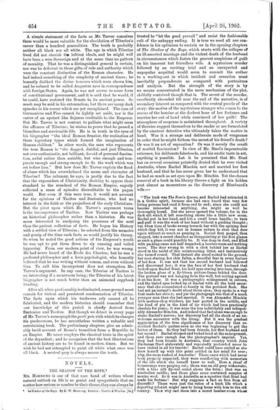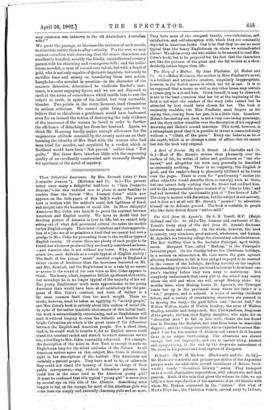NOVELS.
THE SHADOW OF THE ROPE.*
Mn. HORNUNG. is one of that rare band of writers whose natural outlook on life is so genial and sympathetic that no matter how serious or sombre be their theme, they can always be • Its Shadow of the Repo. Dr E. W. lionumg. London 1 ebatto & Wincing. [Ca.] trusted to "let the good prevail" and resist the fashionable cult of the unhappy ending. It is true we need all our con- fidence in his optimism to sustain us in the opening chapters of The Shadow of the Rope, which starts with the collapse of an ill-assorted marriage and the violent death of the husband in circumstances which fasten the gravest suspicions of guilt on his innocent but friendless wife. A mysterious murder followed by an exciting trial and an unexpected and unpopular acquittal would seem to commit the author to a working-out in which incident and sensation must inevitably preponderate as compared with portraiture and analysis. But the strength of the story is by no means concentrated in the mere mechanism of the plot, skilfully contrived though that is. The secret of the murder, excellently shrouded till near the end of the narrative, is of secondary interest as compared with the central puzzle of the story: the motive of the mysterious stranger who comes to the rescuz, of the heroine at the darkest hour of her fortunes and marries her out of band while convinced of her guilt! The atmosphere of suspense is maintained throughout. A variety of theories suggest themselves to the reader or are formulated by the amateur detective who ultimately takes the matter in hand. Was it a strange and deliberate mode of vengeance in order that he might fathom the secret of his friend's death ? Or was it an act of reparation P Or was it merely the result of morbid fascination ? In view of Mr. Steel's impenetrable reticence, his deliberate falsehoods, and his exotic taste in art, anything is possible. Let it be premised that Mr. Steel has on several occasions pointedly denied that he ever visited Australia, where Rachel Minchin met and married her first husband, and that he has never given her to understand that he had so much as set eyes upon Mr. Minchin. Yet the chance removal of a book in his library throws a light on his hidden past almost as momentous as the discovery of Bluebeard's
wife
" The book was The Faerie Queene, and Rachel had extracted it in a Gothic spirit, because she had once heard that very few living persons had read it from end to end ; since she could not become interested in anything, she might as well be thoroughly bored. But she never opened the volume, for in the dark slit which it left something shone like a little new moon. Rachel put in her hand, and felt a small brass handle ; to turn and pull it was the work of her hand without a guiding thought ; but when tiers of books swung towards her with the opening door which they hid, it was not in human nature to shut that door again without so much as peeping in. Rachel first peeped, then stepped, into a secret chamber as disappointing at the first glance as such a place could possibly be. It was deep in dust, and filled with packing-cases not half unpacked, a lumber-room and nothing more. The door swung to with a click behind her as Rachel stood in the midst of this uninteresting litter, and instinctively she turned round. That instant she stood rooted to the ground, her eyes staring, her chin fallen, a dreadful fear in every feature of her face. It was not that her second husband had followed and discovered her ; it was the face of her first husband that looked upon Rachel Steel, his bold eyes staring into hors, through the broken glass of a fly-blown picture.frame behind the door. The portrait was not hanging from the wall, but resting against it on the floor. It was a photographic enlargement in colours, and the tinted eyes looked up at Rachel with all the bold assur- ance that she remembered so keenly in the perished flesh. She had not an instant's doubt about those eyes ; they spoke in a way that made her shiver; and yet the photograph was that of a much younger man than she had married. It was Alexander Minchin with mutton-chop whiskers, his hair parted in the middle, and the kind of pin in the kind of tie which had been practically obsolete for years ; it was none the less indubitably and indisput- ably Alexander Minchin. And indeed that fact alone was enough to shake Rachel's nerves ; her discovery had all the shock of an Un- welcome encounter with the living. But it was the gradual appreciation of the true significance of her discovery that re- doubled Rachel's qualms even as she was beginning to get the better of them. So they had been friends, her first husband and her second ! Rachel stooped and looked hard at the enlargement, and there sure enough was the photographer's imprint. Yea, they had been friends in Australia, that country which John Buchanan Steel elaborately and repeatedly pretended never to have visited in all his travels ! Rachel could have smiled as she drew herself up with this point settled in her mind for ever; why, the room reeked of Australia! These cases which had never been propeily unpacked, they were overflowing with memorials of the life which she herself knew so well. Here a sheaf of boomerangs were peeping out; there was an old grey wideawake, with a blue silk fly-veil coiled above the brim ; that was an Australian saddle ; and those glass cases contained samples of merino wool. So it was in Australia as a squatter that Steel had made his fortune I But why suppress a fact so free from all discredit? These were just the relics of a bush life which a departing colonist might care to bring home with him to the old country. Thar why cast them into a secret lumber-room whose
very existence was unknown to the old Australian's Australian wife ? "
We quote the passage, as becomes the reviewer of such novels, to stimulate rather than to allay curiosity. For the rest, we may content ourselves with observing that the minor characters are excellently handled, notably the kindly, unintellectual country parson with his charming and courageous wife ; and the indus- trious novelist, a man of second-rate talent, but with a heart of gold, who is not only capable of Quixotic impulses, but ready to sacrifice time and money on translating them into action. Langholm—the novelist in question—in the character of the amateur detective, determined to vindicate Rachel's inno- cence, is a most engaging figure, and we are not disposed to cavil at the series of coincidences which enable him to run the culprit to earth, in spite of his initial, but very excusable, blunder. Two points in the story, however, lend themselves to serious criticism. We cannot quite bring ourselves to believe that so chivalrous a gentleman would have harboured even for an instant the notion of destroying the only evidence of the innocence of the woman he loved in order to further the offchance of detaching her from her husband. Again, we think Mr. Hornung hardly makes enough allowance for the ungenerous attitude assumed by the county matrons on their learning the identity of Mrs. Steel with the woman who had been tried for murder, and acquitted by a verdict which in Scotland would have been "Not proven" rather than "Not guilty." But these flaws interfere little with the engrossing quality of an excellently constructed and unusually thought- ful specimen of the novel of mystery.



























































 Previous page
Previous page